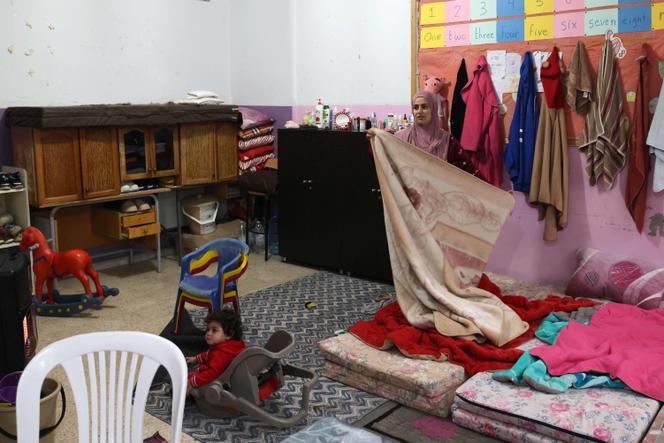


Four-year-old Ali raced his tricycle down the ground-floor corridor of the Tyre technical school, which had been transformed into a collective shelter for families fleeing the clashes on the Lebanese-Israeli border. Since October 8, 2023, the Shiite movement Hezbollah has been fighting the Israeli army on a daily basis. Ali's parents are among the few in this refuge who brought toys with them. They had understood that the move would not be as brief as those who had arrived earlier, in a hurry, in October, had thought. With their two young sons, Doaa Bazzi and her husband only left their home in Bint Jbeil, a small town on the south-eastern tip of Lebanon, in December. After "the Israeli bombardments, which at first only hit the outskirts of Bint Jbeil, hit the heart of the town," said the woman, aged 25.
The couple are among the more than 86,000 inhabitants – according to the United Nations – who have fled their homes in southern Lebanon since October. The luckiest rented accommodation or found homes with relatives, sometimes even in the south, but in areas less exposed to Israeli strikes. The neediest have turned to shelters. The Tyre region is home to the largest number of displaced persons, with over 25,000 in total. "We regularly hear the sound of bombing from a distance," said Bazzi.
So far, the town has been spared. It is not a base for attacks launched by Hezbollah against Israel. But the proximity of violence has put economic activity on hold. The 100 or so displaced people crammed into the school are clinging to the hope that they will soon be able to return home. "We tell ourselves: 'In a few days, it'll be over, we'll go home,'" said Bazzi. "But the days go by. Everyone is now talking about a possible truce [in Gaza, between Hamas and Israel. The previous one, at the end of November, also concerned the Lebanese-Israeli front]. Personally, I don't dare believe it."
In the meantime, they must adapt to a new, precarious life. As Bazzi spoke, the chatter of her neighbors echoed through the room. Tarps acted as partitions dividing the classroom. Because the number of displaced persons has increased, space has had to be created. The lack of privacy bothers the young woman. Mattresses and blankets, distributed on arrival, are stacked on a shelf during the day.
Toilets are shared. Apart from small stoves in each room, there is no real kitchen. Children keep the boredom at bay by playing in the corridor, lending a hand to men unloading food packages or poking their heads into the entrance where a Hezbollah-linked charity had set up shop for a few hours to provide health care. Among the youngsters was Abdallah Obeid, 14: "I could take online courses. But the internet is too slow." That's one more year lost.
You have 55% of this article left to read. The rest is for subscribers only.
